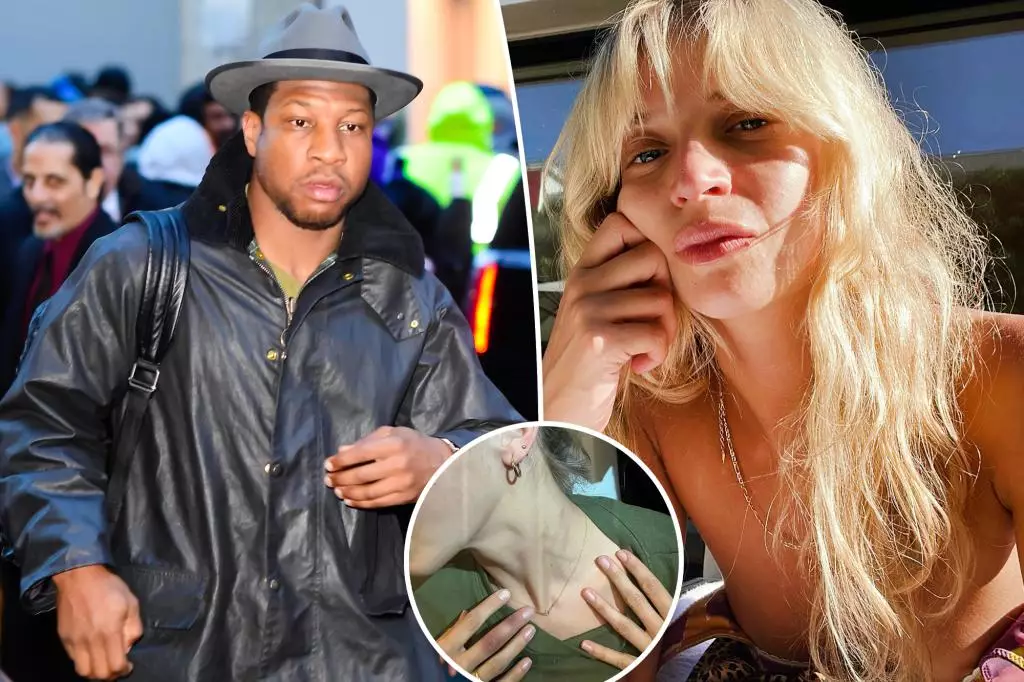The recent alarming revelations surrounding actor Jonathan Majors and his tumultuous relationship with Grace Jabbari have drawn public scrutiny and sparked intense conversations on aggression, accountability, and the complexities of interpersonal relationships. The resurfacing of audio recordings where Majors acknowledges past violent behavior towards Jabbari presents a disturbing reflection of their relationship dynamics. Amidst the rush to judge, it becomes imperative to understand the broader implications of these incidents, not only on the individuals involved but also on societal perceptions of domestic violence and accountability.
During the September 2022 audio conversation, Majors conveys a deeply conflicted emotional landscape. His admission of shame reveals a lingering awareness of his actions that contradicts the societal expectations of masculinity, which often discourage vulnerability. The precise language used by both Majors and Jabbari in that exchange is telling. Jabbari’s phrasing—“You strangled me and pushed me against the car”—stands stark against Majors’ internal struggle and confused self-perception, framing a larger narrative about the normalization of aggression in intimate relationships. It’s a fascination and tragedy intertwined, where the lines between love and violence blur in a toxic dance.
Majors’ conviction for assault and harassment, despite being acquitted on some counts, raises profound questions about justice and accountability in the realm of domestic violence. Many could argue that in an era where protective measures against such acts are increasingly emphasized, the consequences suffered by Majors—a probation sentence and mandated counseling—might appear lenient. Nonetheless, the truth is layered; the conversation has now evolved beyond mere punishment to an examination of rehabilitation. This speaks to a redemptive narrative that may not be accessible in every instance of domestic violence, compelling onlookers to ponder: Can individuals who have behaved violently truly transform, or do they remain forever marked by their transgressions?
Victimhood and Agency in the Legal Battle
As Jabbari filed a lawsuit against Majors, claiming defamation and physical abuse, her narrative underscores the often-overlooked experiences of victims intertwined with their aggressors. The legal confrontation becomes a dual battleground, where personal trauma clashes with public persona. In pursuing her claims, Jabbari not only seeks acknowledgment of her suffering but also attempts to reclaim her agency in a narrative that had previously turned her into a shadow of her former self. Her statements in court documents paint a harrowing picture—one of disempowerment through violence that often goes unnoticed, drowning in the aftermath of public trials.
The finer details painted by Jabbari of being physically restrained and mistreated intensify the urgency of recognizing the psychological impact of such violence. The mention of being thrown against a car or having one’s head repeatedly struck against a hard surface invokes visceral reactions and sidesteps the common tendency to attribute violence solely to physical strength. It is vital to vocalize that emotional and psychological scars run just as deeply, inciting lifestyle complexities for victims that continue long after incidents have occurred.
A Glimpse into Healing and Redemption
Majors’ admission of experiencing abuse from both men and women throughout his childhood adds another layer of complexity to the ongoing narrative. It points toward a deeper cycle of trauma that often perpetuates the very behaviors victimized individuals may seek to escape from. Public fascination with the unfolding drama tends to overlook these intricacies, simplistically framing Majors solely as an aggressor without examining the specter of his own past. The path toward self-awareness, healing, and genuine change is riddled with challenges, and while Majors has now engaged in candid conversations about his struggles, the questions linger: Can he break the cycle? Will he take the necessary steps to rectify his behavior beyond the courtroom and public facade?
Even as Majors and Jabbari navigate their divergent pathways of recovery—he, now engaged to actress Meagan Good—society is called to reflect on the grave consequences of domestic violence and the narratives that surround them. Individual recovery is only one aspect; a collective societal responsibility looms, demanding rigorous dialogues and proactive measures to address such complex issues of power, control, and emotional health openly.

